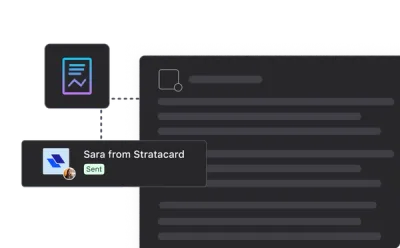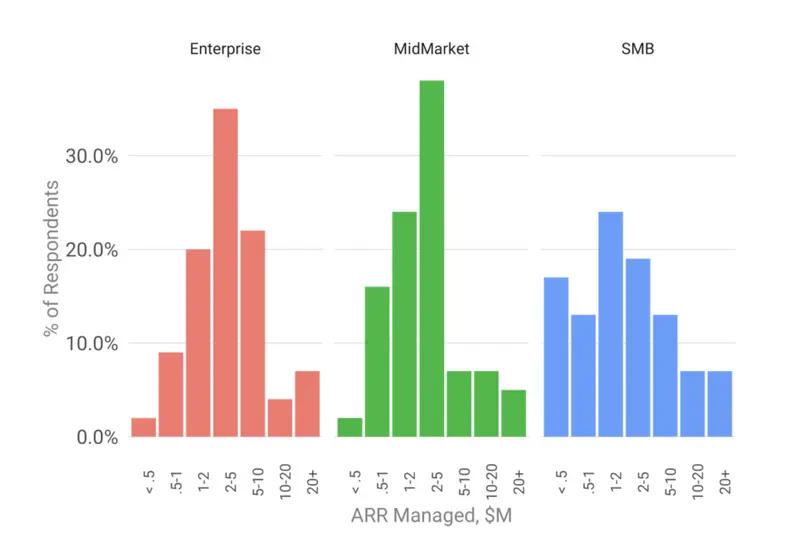
When & Why it’s Critical to Hire A Customer Success Manager

When to make the first client success hire
Is there a simple revenue mark you need to hit to justify your first client success manager? Not really. Most large SaaS companies add one client success manager for about every $2 million in annual recurring revenue, but you can’t wait until you reach $2 million to make a client success hire. As Jason Lemkin wrote, “hire your first CSM as early as you can afford to, as soon as you have even 1 large customer, or even a handful of medium-sized customers.”
Lemkin believes once SaaS companies gain initial traction they can plan to spend anticipate about 10% of existing revenue base on the client success efforts. “At $2m in ARR, budget $200k in headcount for the CSM positions + support. At $4m, $400k, and so on,” Lemkin wrote. “You may be able to pare this back a bit later, but probably not too much.” Using that benchmark is an easy way to keep your company from putting too much pressure on your client success team and keeping you accountable to growing the team. It’s also a simple way to justify your hiring plan.
As a SaaS company, so much of your success will not only rely on your ability to get clients to renew, but also upgrade and provide additional revenue to the deal. A good client success team could be responsible for handling as much as 75% of revenue. Don’t wait too long to make that first hire or risk losing quite a bit of that.

What is a customer success manager?
A client success manager centralizes communication efforts. In the early days, everyone from the head of IT or CEO might field questions, which sets up a potentially confusing system for solving client problems. Once a client success manager is in place, not only does it organize the customer service process but it also provides clients a regular contact. That adds a personal touch to the feedback loop and it will make your customers more comfortable using the product and reaching out when they have issues.
Why hiring a customer success manager is important
Especially in the early days—when you’re scrapping for revenue and closing last minute deals to hit quarterly goals—it’s easy for SaaS startups to overlook client success. Making a hire on the client success side doesn’t provide the immediate returns like a sales or marketing addition. It won’t improve your product like an engineering addition. But a strong client success strategy offers enormous value and is every bit as important as sales, marketing and product. It’s a long-term investment in growth and also an indicator your company will grow faster than your competitors and do it with less capital.
Delight Your Customers
One of the biggest benefits of making your first customer success hire is that they are someone that will be able to delight and expand your existing customer base. Having someone solely dedicated to delighting your customers will help ensure any potential problems, cancellations, or churn are picked up before it is a problem.
Grow Your Business Efficiently
In order to best grow your business it is vital that your existing customers stick around. No matter how fast your sales team is bringing on new customers if they are cancelling or churning shortly after. A customer success manager will be essential in growing your business as your customer acquisition continues to expand.
Free Up Time of Other Team Members
Generally in the early days of a business everyone kind of owns customer success but no one truly owns it. By having someone dedicated to owning customer success you’ll allow the rest of your team to focus on their day-to-day to grow the business in their respective areas.

How much does a customer success manager make
According to PayScale the average customer success manager makes around $68,000/year with the range being anywhere from $49,000 to $120,000. Generally speaking a customer success manager’s salary is largely their base pay with the occasional incentive or bonus plan.
However, the location of the employee can also make an impact on their compensation. For example, a manager in New York City will make more than one in Denver.

Do customer success managers get commission?
According to data from PayScale and BuiltIn, customer success managers generally do receive a small form of commission. PayScale shows that the range floats from $2k to $31k whereas the average from BuiltIn floats around $10k. Generally, commission is not widely expected for the customer success role but including incentives and commissions can be a valuable tool to hire top talent.
What responsibilities does a customer success manager have
As the old adage goes, “it is cheaper to keep an existing customer than to find a new one.” Customer success managers are responsible for engaging, upselling, and building relationships with current customers to make sure they are getting the most out of your product or service. A few of their key responsibilities:
Build Relationships
Arguably the biggest responsibility of a customer success manager is to build and maintain relationships with existing customers. They should have a good understanding of the customer base and should not hesitate to reach out when needed.
Educating the Customers
A customer success manager has the ability to educate your customers and get them deeply engaged with the product.
Upselling & Renewing
Another key role of a customer success manager is the ability to upsell and call on existing customers to upgrade their plan. This is generally done at the end of a period (month, quarter, year, etc.) so strong task management and a follow up cadence is a good trait to mave. If they’ve properly educated a customer an upsell should be an easier accomplishment.
Onboarding
Depending on how the business is structured a customer success manager might own customer onboarding as well. This goes hand-in-hand with educating the customer but this is essential in getting them setup and ready to dive into the product or service.
Understanding Customer Needs
A customer success manager also has the opportunity to impact the product roadmap and help with decision making on where to invest the time of the team. As they are the voice of the customer they should advocate when they notice a trend or gap in the product or service.
How many accounts should a customer success manager have?
There are many varying takes on what a customer success manager’s workload should look like. Some argue it should be a set number of accounts while others say it should be counted by a revenue number.
Managing Accounts
Having a set number of accounts can be tough to translate across different businesses. For example, if the maintenance and contract value are higher they will likely have less time to manage accounts. As the team at ClientSuccess put it, “I prefer to keep the number of accounts in the 25-35 range, but many CSMs can manage up to 50 accounts and still build meaningful relationships, pick up the phone, respond to emails, and eliminate customer challenges in a reasonable amount of time. Any more than 50, though, and a CSM’s ability to proactively engage starts to diminish and the CSM will need to use additional technology and automation to improve his ability to manage the larger number of customers.”

Managing Revenue
On the flipside a more relatable metric might be managing revenue. While this certainly holds true for SaaS businesses it can also make sense for other businesses. When speaking to SaaS companies the contract and customer type impacts the $ of revenue a customer success manager can handle but generally speaking it is anywhere from $2-$5M. As Tomasz Tunguz puts it, “The truth is most CSMs manage between $2-5M in ARR and somewhere between 10-500 accounts. But it varies by segment.” Tomasz Tunguz charted the data by segment in his chart below as well:

What skills should a customer success manager have?
There is no one size fits all when it comes to a customer success manager but there are a few traits that you can keep an eye out for:
Empathetic
Generally speaking a customer success manager needs to be able to step into the shoes of the customers and understand how they are feeling. Not everything goes smoothly so they need to be able to help during down moments and show empathy to the customer base.
Transparent
Being able to have an open and transparent relationship with customers will only strengthen the trust and improve likelihood of an upsell or renewal in the future. If the core responsibility of a customer success manager is relationship building it all starts with building trust.
Proactive
Customer success managers need to be incredibly proactive. They need to sense problems before they happen and not be afraid to reach out before it becomes a real problem. Proactive outreach and communication will keep they ahead of the curve and will help strengthen their relationship.
Customer success manager vs account manager
As a SaaS company, every renewal is a referendum on client success. Each time clients get a bill they have to decide if your software is worth the money. So your client success manager cannot adopt the onboard and release approach, where an account manager typically spends 90 days getting a customer comfortable and then fade away. Instead, your client success manager needs to commit to a multi-year process that involves getting your customers acclimated to your company, developing a rapport and quickly tending to any issues they encounter. That’s what helps keep the renewals coming and increase your customer’s lifetime value.
And your customers will be doing you a service as well. Through solving client’s problems and answering their questions, you’ll be acquiring essential product feedback that will help inform the next wave of iterative improvements.
To learn more about hiring and building culture in the early days of a startup, check out our guide to startup company culture here.




